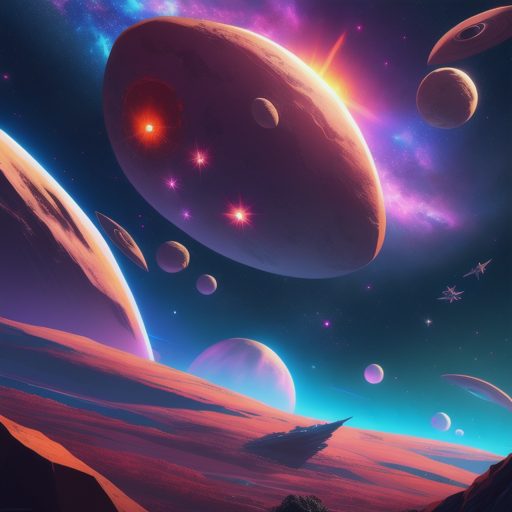
Cosmic oopsie: Universe gains years!
Recommended for Preparatory Grades
Hey there, curious explorer! Guess what? There’s some mind-boggling news about the age of our entire Universe! A scientist named Rajendra Gupta thinks it might be twice as old as we previously believed.
That’s right, instead of being 13.7 billion years old, it could be a whopping 26.7 billion years old!
Mind-Boggling Universe: Double the Age
- Now, how did Gupta come up with this mind-blowing idea? Well, he combined two existing theories: one about the Universe expanding and another called the tired light hypothesis. You see, when we look at faraway objects in space, their light appears a little redder than we expect. It’s like guessing a child’s birthday based on their height. So, the most likely explanation is that space is stretching, pulling the light waves apart, making them redder.
- But there’s another theory from a long time ago that says the light actually gets tired as it travels through space. This tired light hypothesis suggests that light loses energy over huge distances, making it look redder. Sounds silly, right? Well, most scientists didn’t take it seriously because it had some problems. But Gupta thought, “Why not consider both ideas together?”
- Gupta’s super cool hybrid hypothesis combines the expanding Universe theory with the tired light hypothesis. He thinks this combination could explain why the farthest galaxies we see look older and more developed than they should be. It could also explain why they appear smaller than expected, even though they have a lot of stuff inside them.
- So, what does this mean for the age of our Universe? Gupta’s model suggests that it really did start with a Big Bang and expand to its current size. But the twist is that the coupling constant, which describes how forces interact, might have changed over time. This change could affect how light behaves and mess up our calculations of the Universe’s age.
- According to Gupta’s calculations, the Universe could be a staggering 26.7 billion years old instead of the previously estimated 13.7 billion years. That’s like celebrating two birthdays every year for the Universe!
- Now, remember, this is just a new idea that scientists are exploring. They’re like detectives trying to solve a cosmic mystery. They throw all kinds of ideas at the problem to see what makes sense. Some ideas are pretty normal, while others are really out there. They even bring back old, forgotten ideas to see if they can still explain things.
- In the end, whatever explanation scientists discover, it will completely change how we understand our incredible Universe and everything in it. It’s like discovering a whole new playground to explore!
- Isn’t it exciting to think that the Universe could be twice as old as we thought? Our Universe is full of surprises, and scientists like Gupta are always searching for answers. So, keep asking questions and who knows, maybe one day you’ll make a mind-blowing discovery too!
- Oh, and if you want to learn more, Gupta’s research was published in a fancy-sounding journal called the Monthly Notices of the Royal Astronomical Society. Happy exploring, young space adventurer!
Similar Stories
Curious Times is a leading newspaper and website for kids. We publish daily global news aligned to your learning levels (also as per NEP 2020): Foundational, Preparatory (Primary), Middle and Senior. So, check out the News tab for this. We bring kids’ favourite Curious Times Weekly newspaper every weekend with top news, feature stories and kids’ contributions. Check out daily JokesPoke, Tongue Twisters, Word of the Day and Quote of the Day, kids need it all the time.
ME – My Expressions at Curious Times is your place to get your work published, building your quality digital footprint. And it is a good way to share your talent and skills with your friends, family, school, teachers and the world. Thus, as you will step into higher educational institutes your published content will showcase your strength.
Events, Quizzes and Competitions bring students from over 5,000 schools globally to participate in the 21st-Century themes. Here schools and students win certificates, prizes and recognition through these global events.
Sign-up for your school for FREE!
Communicate with us: WhatsApp, Instagram, Facebook, Youtube, Twitter, and LinkedIn.
0 (Please login to give a Curious Clap to your friend.)
